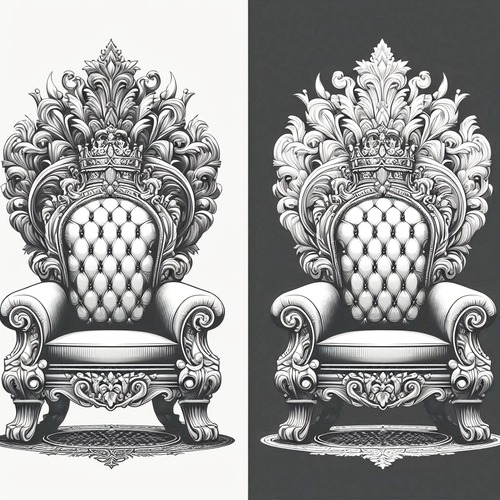Judgement Seat vs. Great White Throne: Are They Different?
When we think about judgement in the Bible, what comes to mind often is a single final day when everyone stands before God. However, Scripture actually reveals two distinct judgement events—with different purposes and participants. Understanding the difference between them provides crucial insight into God’s plan for believers and unbelievers.
TWO THRONES, TWO JUDGEMENTS
JUDGEMENT SEAT VS GREAT WHITE THRONE: The Bible describes two separate judgement scenes that will occur at different times, for different people, and with very different outcomes. Reformed perspectives suggest these judgements reflect both God’s perfect justice and His gracious mercy toward those who are in Christ.
THE JUDGEMENT SEAT OF CHRIST: EVALUATION OF BELIEVERS
The Apostle Paul mentions a judgement specifically for believers (2 Corinthians 5:10). This judgement seat—the bema seat in Greek—was familiar to Paul’s readers as the platform where victorious athletes received their awards. The imagery is significant in understanding the nature of this judgement.
Who Will Appear? Scripture indicates only believers in Christ will appear at this judgement. This aligns with Paul’s use of “we” in 2 Corinthians 5:10 and is reinforced in Romans 14:10-12, both of which are addressed to fellow believers.
What Is Being Judged? At the Judgement Seat of Christ, believers’ works—not their salvation—are evaluated. This is indicated also in 1 Corinthians 3:10-15. This passage reveals several key truths about the Judgement Seat of Christ:
- The foundation is Jesus Christ, established through salvation by faith
- What’s being tested is what believers build on that foundation
- The testing is by fire, revealing the quality of our works
- Some works will endure and be rewarded
- Some works will be burned up, resulting in loss of reward
- Even if all works are burned up, salvation remains intact (“he himself will be saved”)
The Nature of Rewards: These rewards aren’t a matter of earning salvation, which is by grace through faith alone (Ephesians 2:8-9). Rather, they represent God’s gracious recognition of faithful service.
The Bible mentions several possible rewards:
- Crowns for various aspects of faithful service (1 Corinthians 9:25, 1 Thessalonians 2:19, 2 Timothy 4:8, James 1:12, 1 Peter 5:4)
- Positions of responsibility in Christ’s kingdom (Matthew 25:21)
- The joy of the Master (Matthew 25:21)
These rewards flow from God’s grace and our response to it, not from our own merit or worthiness.
THE GREAT WHITE THRONE: JUDGEMENT OF UNBELIEVERS
In stark contrast stands the Great White Throne Judgement, vividly described in Revelation 20:11-15.
Who Will Appear? The Reformed understanding of this passage is that this judgement is primarily for unbelievers—those whose names are not written in the Book of Life. These are people who’ve rejected Christ or never trusted in Him for salvation.
What Is Being Judged? Unlike the Judgement Seat of Christ, the Great White Throne Judgement involves:
- Books of works being opened, containing a record of everything done in life
- The Book of Life being consulted to confirm the absence of their names
- Judgement according to deeds, revealing the justice of God’s condemnation
Jesus also describes this judgement in Matthew 25:31-46 with the separation of sheep and goats, where the unrighteous are condemned based on their failure to demonstrate true faith through works of compassion.
The Outcome The outcome of the Great White Throne Judgment is eternal punishment for those not found in the Book of Life. Reformed theology holds that this punishment is both just and proportional. Scripture indicates there may be degrees of punishment (Luke 12:47-48).
Jesus also said it would be “more tolerable” for Sodom than for unrepentant cities that had witnessed His miracles (Matthew 11:20-24), suggesting varying degrees of punishment.
COMMON MISCONCEPTIONS CLARIFIED
Misconception 1: Believers may still face condemnation at their judgement.
Romans 8:1 firmly declares, “There is therefore now no condemnation for those who are in Christ Jesus.” The Judgement Seat of Christ isn’t about determining salvation, which is already secure for believers.
Misconception 2: All judgements happen simultaneously.
Scripture presents these as separate events at different times. Most Reformed scholars believe the Judgement Seat of Christ occurs after the rapture/resurrection of believers, while the Great White Throne Judgement follows the millennial kingdom.
Misconception 3: Good works can outweigh bad works at the Great White Throne.
Reformed theology emphasises that without the cover of Christ’s righteousness, no amount of good works can justify a person before God (Isaiah 64:6, Romans 3:20). The books of works confirm the justice of God’s judgement, not the possibility of earning salvation.
LIVING IN LIGHT OF FUTURE JUDGEMENT
How should these Bible truths shape our lives today?
For Believers:
- Live for eternal rewards, not just temporal satisfaction. Jesus reminds us to store up treasures in heaven (Matthew 6:19-21).
- Remember that all ministry will be tested. We should build carefully on the foundation of Christ (1 Corinthians 3:10).
- Find comfort in knowing our salvation is secure. We appear before Christ as dearly loved children, not as criminals before a judge.
- Share the gospel with urgency. Knowing the reality of the Great White Throne should motivate compassionate evangelism to those headed for judgement.
For Unbelievers:
The message is clear and urgent: There is only one way to have our names written in the Book of Life—through faith in Jesus Christ. As John 5:24 promises:
“Truly, truly, I say to you, whoever hears my word and believes him who sent me has eternal life. He does not come into judgment, but has passed from death to life.”
CONCLUSION: TWO THRONES, ONE SAVIOUR
Both judgements ultimately reveal the perfect character of God—His justice toward sin and His grace toward those who’re in Christ. The Judgement Seat of Christ showcases His faithfulness in rewarding those who serve Him, while the Great White Throne displays His perfect justice toward those who reject Him.
For believers, the doctrine of the two distinct judgements offers both motivation for faithful service and comfort in our security in Christ. For unbelievers, it’s not just a sobering warning, but also an invitation to find refuge in Christ before that “great and terrible” day.
The question isn’t whether we will face judgement, but which throne we shall stand before. As the writer of Hebrews reminds us, “It is appointed for man to die once, and after that comes judgement” (Hebrews 9:27). Through faith in Christ, we can face that appointment with confidence rather than fear.
JUDGEMENT SEAT VS GREAT WHITE THRONE: RELATED FAQs
Will believers witness the Great White Throne Judgement? Scripture doesn’t explicitly state whether believers will witness the Great White Throne Judgement. However, since believers will reign with Christ (Revelation 20:4-6) and will even participate in judging angels (1 Corinthians 6:3), it’s reasonable to conclude believers may observe this final judgement as part of their reign with Christ.
- How does the Reformed view of election relate to these two judgements? In Reformed theology, God’s sovereign election determines which judgement a person will face. Those whom God has elected to salvation through Christ will appear at the Judgement Seat of Christ for reward, while those not elected will face the Great White Throne. This flows from the Reformed understanding that salvation is entirely by God’s sovereign choice (Romans 9:14-24). The judgements themselves will evaluate actual works done in the body as a manifestation of either saving faith or its absence.
- What happens between a believer’s death and the Judgement Seat of Christ? Reformed theology teaches that believers who die enter immediately into the presence of the Lord in an intermediate state (2 Corinthians 5:8, Philippians 1:23). During this time, believers experience conscious joy in God’s presence while awaiting the resurrection of their bodies. The Judgement Seat of Christ will occur after this resurrection, when believers receive glorified bodies and their works are evaluated for reward.
Will our sins be publicly revealed at the Judgement Seat of Christ? The Reformed perspective generally holds that sins already covered by Christ’s blood will not be publicly exposed at the Judgement Seat. God promises He remembers our sins no more (Hebrews 8:12) and has removed them as far as the east is from the west (Psalm 103:12). The focus of this judgement, therefore, appears to be on evaluating works for reward rather than exposing forgiven sin. Christ’s judgement will be perfectly just but also perfectly gracious toward those He has redeemed.
- How do these judgements relate to the Reformed view of the millennium? Different millennial views within Reformed theology place these judgements at different points in eschatological chronology. Amillennialists typically see both judgements occurring at Christ’s single return, while premillennialists place the Judgement Seat of Christ at the beginning of the millennium and the Great White Throne at its conclusion. Postmillennialists generally place both judgements at the end of the millennial age. All views, however, maintain the distinction between the judgements’ purposes and participants.
- Will infants or those with cognitive disabilities face the Great White Throne Judgement? Reformed theology has traditionally affirmed God’s special mercy toward infants who die and those with severe cognitive disabilities who cannot comprehend the gospel. Based on passages like 2 Samuel 12:23 (David’s confidence about his deceased infant) and God’s perfect justice and mercy, many Reformed theologians believe God graciously applies Christ’s redemption to these individuals. While not explicitly stated in Scripture, this view trusts in God’s character to do what is perfectly just and merciful.
Can works done by unbelievers reduce their punishment at the Great White Throne? While Reformed theology affirms degrees of punishment (Luke 12:47-48), good works by unbelievers cannot reduce their fundamental separation from God. These works, though outwardly moral, remain tainted by wrong motives—being done without faith in and love for God (Romans 14:23, Hebrews 11:6). The degrees of punishment likely relate more to the extent of one’s rebellion and the light rejected than to any merit from good works performed apart from saving faith.
JUDGEMENT SEAT VS GREAT WHITE THRONE: OUR RELATED POSTS
Editor's Pick

GPS Without Eyes: How Ants Silently Shout Intelligent Design
Picture a leafcutter ant navigating the rainforest floor in pitch darkness, carrying a leaf fragment 50 times its body weight. [...]

Born Broken: Why Must We Affirm Original Sin?
Imagine a world where we’re born neutral—free to choose good, and without a bias toward evil. Sounds appealing… until we [...]

Does God Truly Care About My Everyday Choices?
OWe believe God created the universe. We believe He orchestrated the exodus from Egypt and raised Jesus from the dead. [...]
SUPPORT US:
Feel the Holy Spirit's gentle nudge to partner with us?
Donate Online:
Account Name: TRUTHS TO DIE FOR FOUNDATION
Account Number: 10243565459
Bank IFSC: IDFB0043391
Bank Name: IDFC FIRST BANK






